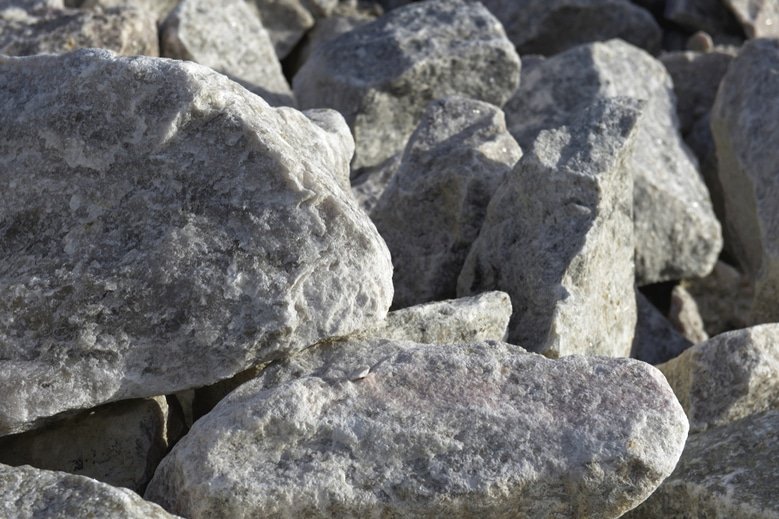
The lithium market experienced a mix of ups and downs last month.On the downside, automakers delivered some blows to lithium demand.Mercedes has backed away from its 2030 “EV only” goal, while Lucid and Rivian reported weaker EV demand than anticipated, directly affecting lithium needs.Additionally, a shipping bottleneck has led to a surplus of China’s EVs meant for abroad, further dampening lithium sales.As a result, lithium and lithium equities have been taking it on the chin to start the year.Prices for spodumene in China and Australia have slid 35% and 15% respectively year to date.
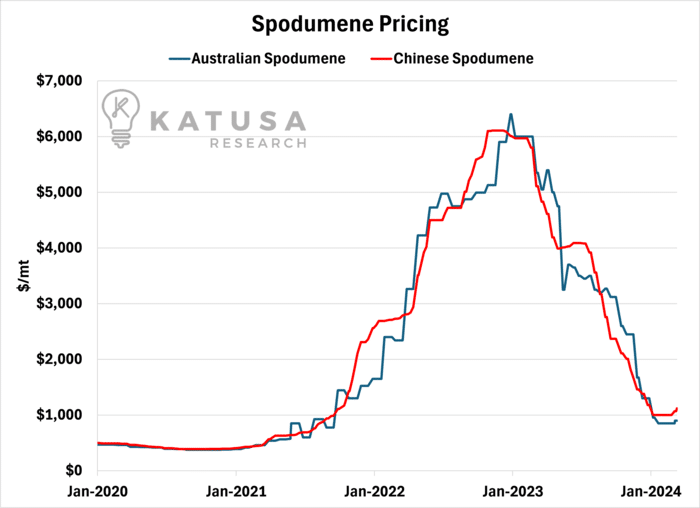
Lithium Carbonate pricing has also dropped, with prices hovering near $14,000 per metric tonne, as the lithium carbonate price was over $40,000/tonne just 9 months ago.In the last six months, falling prices for lithium carbonate and spodumene have paused development and expansion, leading some medium to high-cost producers to halt production.However, there’s bullish news…In the last couple of weeks, the lithium price has snapped back 21% and resulted in a sharp bounce in lithium stocks off a multi-year bottom.
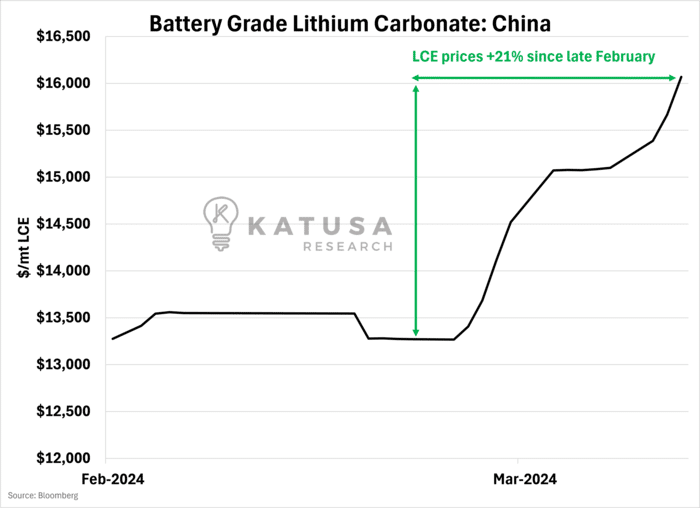
More bullish news came on February 27th, when two major battery companies forecasted a 70-80% production boost for March 2024 over February.With January and February’s capacity utilization at 35-40% for top battery makers, this increase could push utilization near 80%.
- That day also saw lithium futures in China jump by 9%
Additionally, Western lithium supply databases discovered an untracked extra 50,000 tonnes of LCE from China’s high-cost lepidolite producers, contributing to the price surge.
An Eye on Lithium Cash Costs
Despite this, low prices are self-correcting as high-cost producers in China, Australia, and Africa might be operating at a loss.Yet, as shown in the chart, most production remains profitable at current prices.
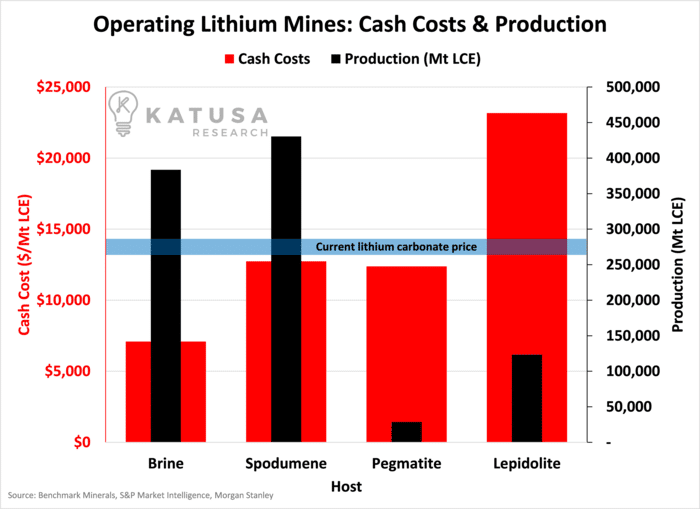
On average, the major brine and spodumene mines are still able to break even, with average cash costs of production ranging from $7000-$12000 per metric tonne of LCE.
- Cash costs are different than all in costs (AISC) which as a general rule of thumb, add 50% to the mine cash costs. Lepidolite producers are out of money and are producing at a loss.
Recent updates on our data feeds show that lepidolite’s contribution to the market is 13%, not the 6% previously estimated, doubling its market share to 100,000 tonnes out of 900,000.Analyzing global production by dividing it into four ‘quartiles’ reveals that 65-70% of production remains viable at present cash costs.Even if not profitable, these producers are likely to keep operating, hoping for market improvements, a trend consistent across commodities over the past two decades…
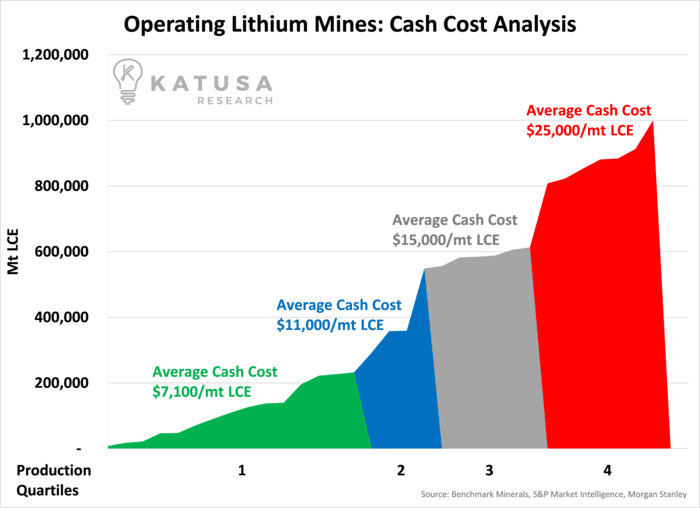
Lithium Learning from Uranium Markets
If we think about the uranium bear market which saw prices collapse to $17/lb no mine on the planet could turn a profit after 12 months when all in costs were applied.That is why we saw two of the world’s largest, highest grade, and profitable mines, McArthur River and Cigar shut down production.Although the prices of lithium have cratered, we are not at the “uranium lows” moment where the highest grade and largest mines are shutting.From the table below you will see that relative to other commodities, lithium prices are highly volatile.
- After stale or major drawdown periods, prices can snap back and soar.

Often, Lithium is either one of the best or worst-performing commodities.This means that companies with direct exposure will also take big swings in valuation.
Profitable Producers are Coming Back
In recent news, Arcadium Lithium (a recent merger of FMCs spinout Livent and AllKem) a top 5 global lithium producer, forecast that at a selling price of $15,000/t LCE, company’s EBITDA margin would be 34%.This is another useful data point, showing that large producers are still profitable.Could lithium prices go lower? Yes, it is possible.Especially if China wants to pull a “Cut to Kill” strategy to increase their global exposure to the largest, highest-grade lithium mines.
- (For some background on the “Cut to Kill” strategy see this piece when Russia and Saudi Arabia employed this in the oil markets. And Kazatomprom has done the same in Uranium).
Despite the short-term pessimism surrounding lithium prices, the long-term outlook based on supply and demand dynamics is far more compelling.Projects that are not under Chinese control, situated in mining-friendly +SWAP Line Nations with strong rule of law, and positioned in the lowest production cost quartile close to battery manufacturing centers, will be considered premium assets.
A Lithium Market Contender
Amidst a sector-wide downturn, one standout in our Katusa’s Resource Opportunities portfolio defies trends, showcasing robust geological results that hint at a substantial lithium deposit.While peers falter, this company excels, diving deeper into its flagship project to reveal promising mineralization at depths previously uncharted.Recent drills are going deeper and have hit significant lithium-rich zones…Potentially expanding the project’s value exponentially and drawing major mining players’ attention.We’re watching closely as this hidden gem begins to outshine the competition, positioning itself as a key player in the lithium market’s future.Click here to learn more and get the details.Regards,Marin Katusa
Details and Disclosures
Investing can have large potential rewards, but it can also have large potential risks. You must be aware of the risks and be willing to accept them in order to invest in financial instruments, including stocks, options, and futures. Katusa Research makes every best effort in adhering to publishing exemptions and securities laws. By reading this, you agree to all of the following: You understand this to be an expression of opinions and NOT professional advice. You are solely responsible for the use of any content and hold Katusa Research, and all partners, members, and affiliates harmless in any event or claim. If you purchase anything through a link in this email, you should assume that we have an affiliate relationship with the company providing the product or service that you purchase, and that we will be paid in some way. We recommend that you do your own independent research before purchasing anything.






